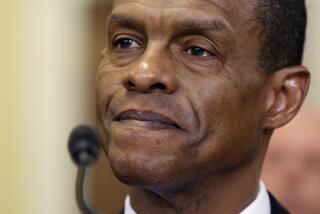Son’s Overdose During Riots Preoccupied Him, Chief Says
- Share via
NEW YORK — Los Angeles Police Chief Daryl F. Gates said during a tour promoting his new book Wednesday that he was greatly preoccupied by his only son’s near-death from a drug overdose during the recent riots.
Gates revealed the overdose during a taping of the “Donahue” show as he discussed his autobiography, “Chief: My Life in the LAPD,” which details his troubled relationship with his son, Scott.
“They thought he was going to die,” Gates said. “It was deeply on my mind during the riot.”
But the police chief, expected to retire at the end of June, also said he did not visit his son in the hospital and has not seen him since his recovery and release. Later, Gates told reporters his decision not to visit was part of the “tough love” approach he has adopted since his 36-year-old son became a chronic user of drugs ranging from marijuana to heroin.
Asked whether the incident affected his leadership during the riots, Gates replied: “Naturally, it’s a distraction. But if nothing else, I’m a consummate professional.” He told talk-show host Phil Donahue the overdose occurred on Friday, May 1, two days after the riots began.
Gates has been on a whirlwind East Coast book tour since Monday, making appearances on nationally televised programs such as “Good Morning, America,” the “Today” show and “Donahue.” Throughout the tour, his son’s drug abuse and criminal record have been a humanizing element that talk-show hosts have repeatedly mined during interviews.
But the overdose was first mentioned Wednesday. The chief, as well as spokesmen for Donahue and Bantam Books, Gates’ publisher, denied that it was raised as a publicity stunt or to garner sympathy.
“What kept you from cracking on this?” Donahue asked Gates, referring to emotional pressure from the overdose in the wake of the riots, the Rodney G. King beating and political turmoil within the LAPD.
“I will admit that Scott gets to me each and every time and that (the overdose) was extremely distracting to me,” Gates said. “It’s always on your mind. It’s a constant ache in the middle of your chest.”
More to Read
Sign up for Essential California
The most important California stories and recommendations in your inbox every morning.
You may occasionally receive promotional content from the Los Angeles Times.













